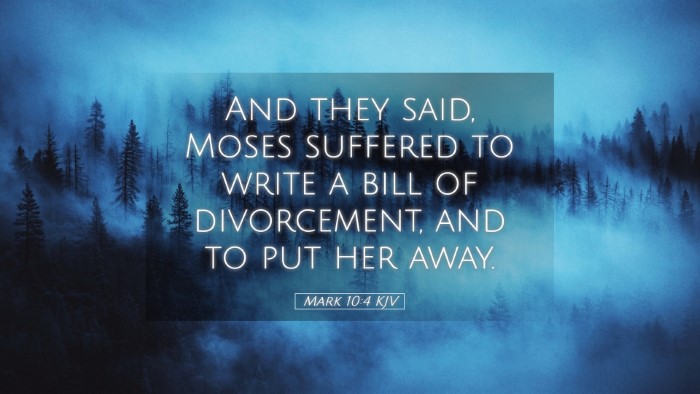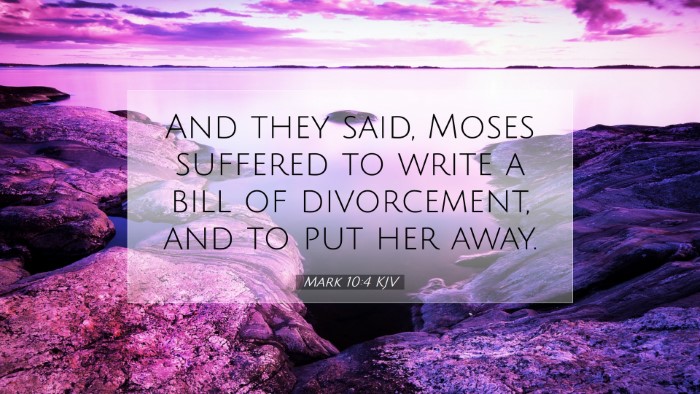Commentary on Mark 10:4
Mark 10:4 presents a significant teaching moment regarding the nature of marriage and divorce, highlighting the legalistic mindset prevalent in Jesus' time. The verse reads, "They said, Moses permitted a man to write a certificate of divorce and to put her away." This passage reveals the reliance on Mosaic Law in discussions of divorce and the heart of Jesus’ response to it. Below we delve into various commentaries for a deeper understanding.
Contextual Analysis
Understanding the context is crucial for grasping the implications of this verse. The Pharisees were testing Jesus, attempting to entrap Him using the Scriptures. They refer to Moses' allowance for divorce as a means to justify their views, reflecting the human tendency to exploit religious laws for personal convenience. The practice of divorce was contentious, and different sects, such as the Pharisees and the followers of Hillel, had varying interpretations regarding its permissibility.
Commentary Insights
Insights from Matthew Henry
Matthew Henry emphasizes that the permission given by Moses was not an endorsement of divorce but rather a concession to human hardness of heart. He notes that the key intent of the law was to regulate divorce in a manner that ensured some protections for women, indicating that God’s original design for marriage was for permanence and unity.
- Human Hardness: Henry points out that Moses’ allowance was a response to the fallen condition of mankind, showcasing a divine concession rather than a divine ideal.
- The Certificate of Divorce: This legal document served to protect the woman by providing some legitimacy to her separation, reflecting the significance of legal protocol in matters of faith.
- Divine Intent: The intent behind God’s design for marriage is seen as critical; Henry strongly advocates for the sanctity of marriage as more than a contract, but as a covenant established by God.
Insights from Albert Barnes
Albert Barnes focuses on the interpretation of divorce within Jewish tradition and its implications for Christian faith. He underscores that while Moses allowed divorce, this should not be misconstrued as an ideal sanctioning of the practice.
- Nature of the Law: Barnes asserts that Jesus' discussion brings clarity to the nature of God’s law; it emphasizes accountability in relationships and the elevation of marriage's value.
- Pharisaical Views: He critiques the Pharisees for distorting Scripture to fit their justification for divorce, showcasing the importance of aligning interpretations with God’s original design.
- Restoration of Marriage: The essence of Jesus' teaching points towards restoration rather than dissolution, urging deeper commitment and understanding in marital relationships.
Insights from Adam Clarke
Adam Clarke provides a thorough examination of the cultural and historical implications of divorce laws during biblical times. He notes that the mention of a divorce certificate implied a systematized method of separation but did not necessarily reflect God’s will for marriage.
- Legalistic Approach: Clarke emphasizes that the legal system of the day often overshadowed the relational dynamics intended by God for marriage.
- Cultural Context: He delves into how societal norms influenced the understanding of marital relationships, suggesting that much of what was accepted culturally was contrary to God’s design.
- Call to Faithfulness: Clarke invites believers to uphold the sanctity of marriage, reinforcing that true faithfulness involves adhering to God’s principles over cultural conveniences.
Theological Implications
This verse invites a deep theological reflection on the nature of God’s commandments concerning marriage. It challenges pastors, students, and scholars to consider the original intent behind God’s design for marital relationships and the ways in which human interpretations can often diverge from divine principles.
Key Reflections
- Understanding God’s Will: The need for thorough study of Scripture in light of historical and cultural contexts is paramount for proper interpretation.
- Divine vs. Human Law: The distinction between what is permissible versus what is ideal encourages believers to search for deeper commitment in relationships.
- Covenantal Relationships: Emphasizing that marriage is a covenant invites a more profound understanding of love as a divine commitment rather than a casual agreement.
Conclusion
Mark 10:4 serves as a pivotal moment in understanding the complex relationship Jesus had with the law and the profound truths about marriage and divorce. Incorporating insights from key commentators like Matthew Henry, Albert Barnes, and Adam Clarke reveals an intricate blend of legal, cultural, and theological interpretations that challenge contemporary readers to live in accordance with God’s principles. As we reflect on this verse, let us strive to understand and uphold the sanctity of marriage as a sacred covenant designed by God.


